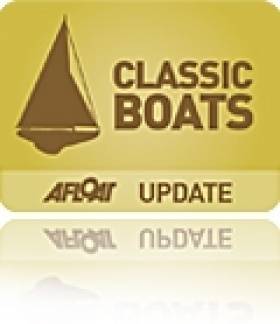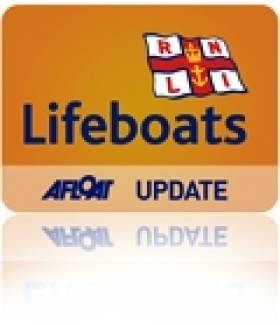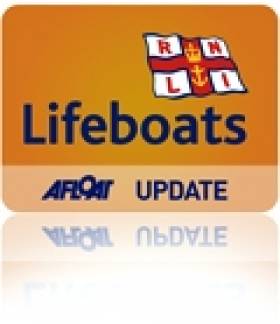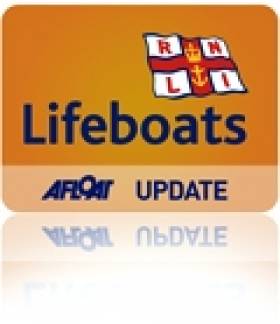Displaying items by tag: Royal National Lifeboat Institution
#beargryllslifeboat – TV adventurer, Bear Grylls, has given his support to a campaign to save Ireland's most famous lifeboat. His great grandfather, Sir Walter Smiles, was among 130 people who died in the Princess Victoria tragedy of 1953. The Royal National Lifeboat Institution's volunteer crew at Donaghadee in Northern Ireland, aboard the Sir Samuel Kelly lifeboat, risked their lives in monstrous seas to save 33 passengers. The lifeboat was also involved in saving yachtsmen during the Fastnet yacht race disaster in 1979.
Bear Grylls said: "I am delighted to express my support and extend my best wishes to the Sir Samuel Kelly Project.
"I do so out of respect for the 133 passengers who were lost in the Princess Victoria tragedy of 1953. The dead include my great grandfather Sir Walter Smiles at whose home in Donaghadee I spent many happy summer days as a boy.
"I do so also out of respect for the Royal National Lifeboat Institution and the volunteer crew of the Sir Samuel Kelly lifeboat who battled monstrous seas for 36 hours and risked their own lives to rescue 33 people from the ferry. To the crew of today's RNLI lifeboat based in Donaghadee, and the 234 RNLI lifeboat crews around the coasts of Britain and Ireland, I express my admiration at their courage and commitment.
"The restoration and preservation of the Sir Samuel Kelly lifeboat, and the construction of a heritage centre in Donaghadee to provide it with a permanent home, will create a fitting memorial to all those who were touched by the Princess Victoria tragedy. It will be a lasting reminder that we are all at the mercy of nature and of the need for preparedness and professionalism when saving lives at sea."
The SSK Project is a public appeal, initially to raise between £15,000 and £20,000, which will be used to build a temporary shelter for the lifeboat. The shelter has been designed by architects Fraser Bell and Michael Collins. This will allow it to dry out and the restoration job to be assessed. The project's next goal is to secure Lottery funding to build a permanent museum with the lifeboat as a centrepiece.
Project spokesman Ken Walsh, said: "We know Bear has a special place in his heart for Donaghadee. He tells us it is where he found his love of the sea and the wild. We are delighted to have his support and encouragement.
"The Sir Samuel Kelly is an important part of Ireland's maritime heritage and is on the UK's National Historic Ships register. Restored, it will be a lasting memorial to the people who were lost in the Princess Victoria and Fastnet tragedies. It will also be a fitting tribute to the bravery of the RNLI crews who daily risk their lives to save others. With public support we believe we can raise the £500,000 needed to build her a fitting home in a town where she was stationed for 25 years and is still cherished."
Expressions of interest and contributions are welcome at the project's new website here or on Facebook.
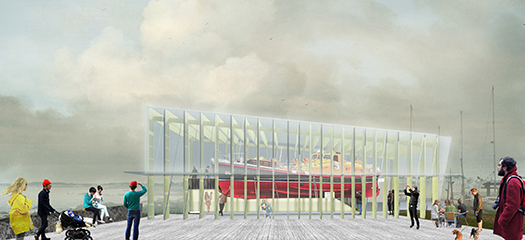
Artist's impression of the proposed temporary shelter
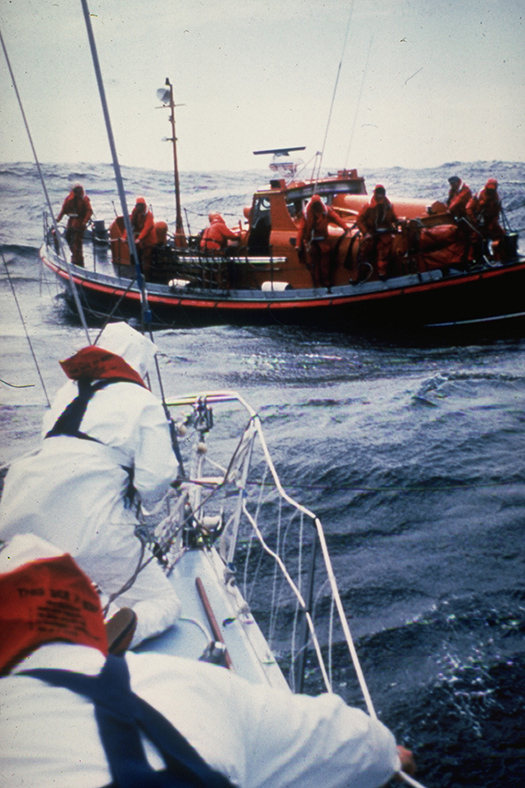
Action stations - The Sir Samuel Kelly during the Fastnet disaster. Picture courtesy of Ambrose Greenway and the RNLI
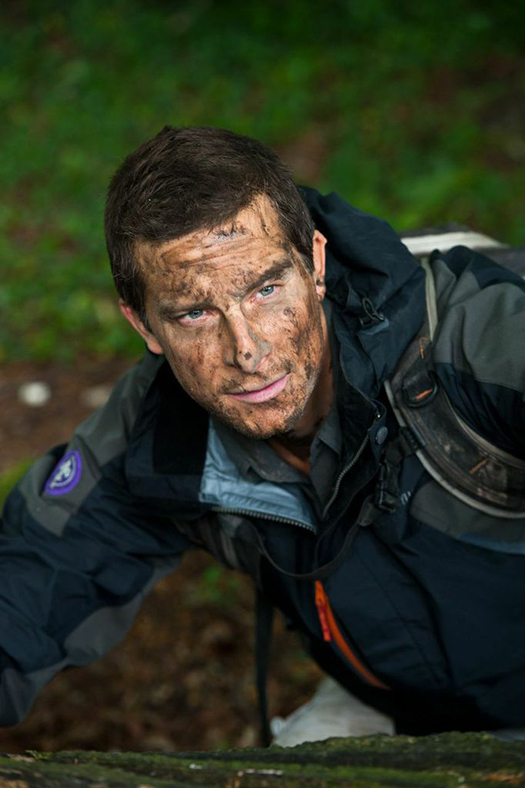
Bear Grylls
The Sir Samuel Kelly lifeboat was named after a Belfast coal importer and philanthropist who died in 1937. It was built by J Samuel White & Co at Cowes on the Isle of Wight in 1950. The Watson class lifeboat was stationed at Donaghadee from 1951 until 1976 then was part of the RNLI reserve fleet at Courtmacsherry, Co Cork, until retirement in 1979. An RNLI bravery medal and a British Empire Medal were awarded to the Kelly's coxswain Hugh Nelson for his role in saving 33 from the Princess Victoria in 1953. The lifeboat was purchased by the Ulster Folk and Transport Museum and passed to the project group in 1985.
Bear Grylls has become known around the world as one of the most recognized faces of survival and outdoor adventure. His journey to this acclaim started in the UK, where his late father taught him to climb and sail. Trained from a young age in martial arts, Bear went on to spend three years as a soldier in the British Special Forces, serving with 21 SAS. It was here that he perfected many of the skills that his fans all over the world enjoy watching him pit against mother-nature. His TV shows Man Vs Wild and Born Survivor became some of the most watched programmes on the planet with an estimated audience of 1.2 billion. He also hosts the hit adventure show Running Wild on NBC in America, as well as The Island with Bear Grylls on C4 and Mission Survive for ITV.
He is currently the youngest ever Chief Scout to the UK Scout Association and is an honorary Lt-Colonel to the Royal Marines Commandos. He has authored 15 books including the number one Bestseller: Mud, Sweat & Tears.
RNLI Appeals for Donations to Ensure Its Survival
The Royal National Lifeboat Institution (RNLI) has issued an appeal for funds to ensure its survival.
The volunteer crews from the RNLI go to sea hundreds of times a year to help those in danger off the Irish coast, often in terrible conditions.
One recent rescue reported on Afloat.ie saw the Fenit inshore lifeboat launched to go to the aid of a fishing vessel in Tralee Bay having difficulties in thick fog.
The lifeboat successfully found the disorientated oyster fishing boat, with three crew members aboard, then discovers two further oyster fishing boats also struggling in the fog. All three were escorted safely back into the harbour.
The last two years were the busiest in the RNLI's history, the organiation says, but income is in danger of not keeping pace.
Last year volunteer-crewed lifeboats rescued 813 people from the seas around the Irish coastline, They are ready to go to sea whatever the conditions, and are on call 24 hours a day. But they can't do this without your help.
The RNLI is a charity and relies on donations to keep the lifeboat service running. If you can give anything, please forward it to the RNLI Fundraising Appeal, RNLI Ireland, Dept AA1280, PO Box 4214, Freepost, Dublin 2.
Bangor Helmsmen Awarded Medals for Twenty Years Service
Recently two well known and respected volunteer Bangor Lifeboat helmsmen were awarded medals in recognition for their many years of devoted service to the Royal National Lifeboat Institution.
Ewan Scott and Tommy Burns have been awarded Long Service medals at recent RNLI ceremonies. During their 20 years of dedicated service, RNLI Bangor Lifeboat has undertaken a total of 845 rescues at sea resulting in the saving of 98 lives.
Both Ewan and Tommy are of one mind and agree that over the years there have been many improvements to the lifeboats, the equipment and training all of which has greatly enhanced the RNLI's ability to save life at sea.
Even after over 20 years of service Ewan and Tommy continue to freely give of their time and effort. They are considered by all to be the most experienced helmsmen at Bangor station and are actively involved in the training of crew and other volunteers.
Bangor's Lifeboat Operations Manager Kevin Byers paid tribute to Ewan and Tommy when he said 'Without the huge commitment and dedication of volunteers like Ewan and Tommy, the RNLI would be unable to carry out the increasingly demanding task of saving lives at sea.' Kevin went on to say 'I am delighted that Ewan and Tommy have been presented with these awards, they deserve a big thank you for all they have done for Bangor Lifeboat over the past 20 years.'
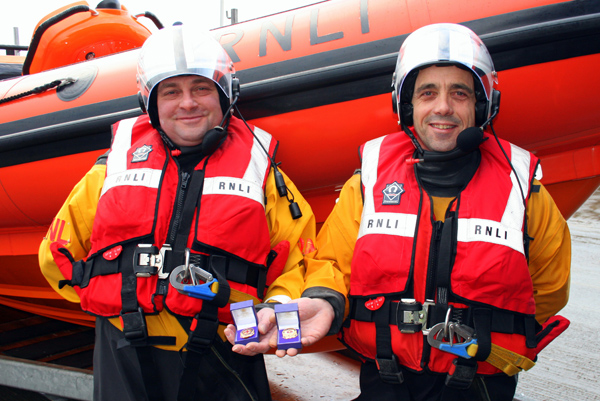
Related Safety posts
RNLI Lifeboats in Ireland
Safety News
Rescue News from RNLI Lifeboats in Ireland
Coast Guard News from Ireland
Water Safety News from Ireland
Marine Casualty Investigation Board News
Marine Warnings
Enniskillen and Baltimore Busiest Irish Lifeboats, Launching Five Times a Day in Summer
Preliminary figures* for summer 2010, issued today (22 September) by the Royal National Lifeboat Institution (RNLI), show the charity's Irish lifeboats launched on average five times every day during June, July and August.
RNLI lifeboats were requested to launch 450 times during June, July and August. The busiest station in Ireland was Enniskillen in Fermanagh with 29 launches followed by Baltimore in West Cork with 23 callouts. Fifty-four of those launches were in Dublin at lifeboat stations in Dun Laoghaire (22), Howth (20) and Skerries (12). Read more about the year's lifeboat rescues in 2010 HERE
The figures come on the back of a significant investment by the charity in the Irish lifeboat fleet. New inshore lifeboats have been put on service in Dun Laoghaire, Kilrush in Clare and Fenit in Kerry. These new lifeboats are fast, efficient and technically equipped to reach casualties faster and to provide increased cover around the coast.
Commenting on the RNLI summer lifeboat launches, RNLI Training Divisional Inspector, Owen Medland, said, 'It has been a busy Summer for Irish lifeboat crews. Over the course of those three months there have been a number of dramatic and challenging callouts for our volunteers. This summer RNLI Sea Safety volunteers have run a number of lifejacket clinics and flare demonstrations around the coast and at inland waterways to advise all water users on how to stay safe on the water.'
RNLI Operations Director, Michael Vlasto, added: 'The summer is always busy as more and more people opt to relax at the coast. The figures show that our volunteers are called on much more during this time and the fact they respond every time the pager goes off shows just how committed they are to saving lives at sea.
'Many of our lifeboat volunteers are also particularly busy at this time with their day jobs as many of them work in the tourism industry, so we are especially grateful to them in summer – and to their employers who allow them to stop work at the "bleep of a pager" to help others, and given the current economic climate for businesses this is a great contribution to the charity.'
Read more about the year's lifeboat rescues in 2010 HERE
Related Safety posts
RNLI Lifeboats in Ireland
Safety News
Rescue News from RNLI Lifeboats in Ireland
Coast Guard News from Ireland
Water Safety News from Ireland
Marine Casualty Investigation Board News
Marine Warnings



























